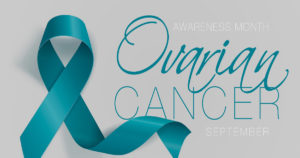Ovarian Cancer Awareness Month
September 18, 2020 Ovarian cancer is the fifth-leading cause of cancer deaths for American women. When a doctor catches and treats ovarian cancer early, the survival rate hovers around 92%. Sadly, only 15% of ovarian cancer cases are found in Stage 1, or before cancerous tumors have spread throughout the pelvis, abdominal lining, lymph nodes, and other organs. In observance of Ovarian Cancer Awareness Month this September, it is the perfect time to make sure you know the warning signs and symptoms in order to take charge of your health and to make a positive impact on early detection rates.
Ovarian cancer is the fifth-leading cause of cancer deaths for American women. When a doctor catches and treats ovarian cancer early, the survival rate hovers around 92%. Sadly, only 15% of ovarian cancer cases are found in Stage 1, or before cancerous tumors have spread throughout the pelvis, abdominal lining, lymph nodes, and other organs. In observance of Ovarian Cancer Awareness Month this September, it is the perfect time to make sure you know the warning signs and symptoms in order to take charge of your health and to make a positive impact on early detection rates.
Fast Facts on Ovarian Cancer
Ovarian cancer originates in the tissues of the ovary. Although there are several different types of ovarian cancer, two of the most common kinds are ovarian epithelial carcinomas and malignant germ cell tumors. Ovarian epithelial carcinoma typically begins growing in the cells on the surface of the ovary, whereas malignant germ cell tumors originate in the egg cells. Ovarian cancer is one of the deadliest of cancers for women. Approximately 21,000 women are diagnosed in the U.S. with it every year.
1 in 78 women will develop ovarian cancer in their lifetime. Certain risk factors increase a woman’s chances for developing ovarian cancer, such as having a family history of the disease. According to the American Cancer Society, or ACS, other factors that increase a woman’s risks for developing ovarian cancers include:
- Two-thirds of women with ovarian cancer are 55-years-old or older
- Taking hormone therapy after menopause
- Having children later in life or never having a full-term pregnancy
- Being overweight or obese
- Certain fertility treatments
- Smoking
- Genetic mutations. Women who inherit the BRCA1 or BRCA2 genetic mutation have higher ovarian cancer risks. Roughly 10-15% of total cases are attributable to mutations of the BRCA1 or BRCA2 genes
- Personal cancer history. Some women who had breast cancer are more likely to develop ovarian cancer
- Use of talc-based personal hygiene products like J&J Baby Powder or Shower-to-Shower
One of the biggest obstacles to early detection and positive health outcomes is the lack of symptoms that many women experience when their cancer is still in the early stages. Women with an increased risk level, like those with a genetic mutation or with a family or personal history, should discuss what helpful prevention and early detection steps they can take with a trusted gynecologist or general health care provider.
If symptoms are present, some of the most common ones are pelvic or abdominal pain, bloating, difficulty eating or feeling full quickly, and urinary symptoms like the urgent need to urinate or having to go to the bathroom more often than normal. Other possible symptoms of ovarian cancer include having an upset stomach, constipation, back pain, pain during intercourse, fatigue, and changes in a woman’s period (e.g. irregular periods or heavier bleeding than normal). If you are experiencing concerning physical changes or possible symptoms, make an appointment with your doctor. Early detection and intervention are some of the most effective tools when it comes to improving a woman’s chances for beating the disease.
Our team at Galfand Berger is committed to promoting awareness for ovarian cancer, which claims too many lives every year. This Ovarian Cancer Awareness month we honor those that we have lost and pledge to continue working towards a brighter future and advocating for patient health and safety. If you were diagnosed with ovarian cancer and have questions or concerns about the care you have received, someone at our firm can help. Contact a representative online now.
Philadelphia Medical Malpractice Lawyers at Galfand Berger, LLP Represent Victims of Medical Negligence
With offices located in Philadelphia, Bethlehem, Lancaster, and Reading, Galfand Berger serves clients throughout Pennsylvania and New Jersey. To schedule a consultation, call us at 800-222-8792 or complete our online contact form.
 Google Screened
Google Screened
